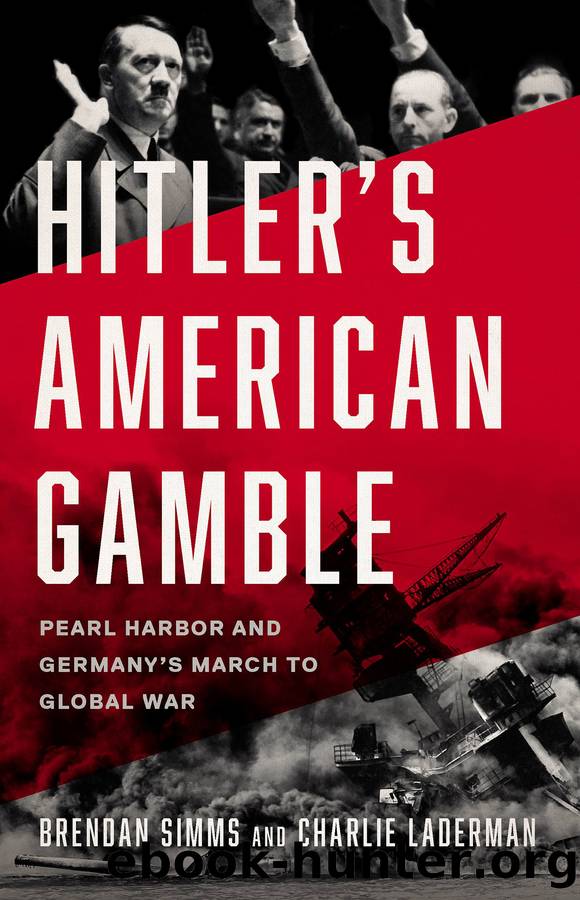Hitler's American Gamble by Brendan Simms

Author:Brendan Simms [Brendan Simms and Charlie Laderman]
Language: eng
Format: epub
Publisher: Basic Books
Published: 2021-11-02T00:00:00+00:00
Across Europe, even those who knew little of the diplomatic machinations sensed that the world was in flux, though there was not much consensus on what to make of it. The German writer Ernst Jünger, stationed in Paris, was confused. He wrote that day that he caught himself âmixing up the alliances.â Sometimes Jünger thought that Japan had declared war on Germany rather than the United States. Everything, he felt, was âinextricably snarled up like snakes in a sack.â184 In Romania, Mihail Sebastian spoke of âa new type of warâ in the Pacific âunlike anything we have seen since August 1939.â He was stunned by the Japanese âBlitz techniqueâ and found it âmost disturbing to see America taken by surprise like any old Belgium or Yugoslavia.â185 Word of Pearl Harbor had finally penetrated to the heart of the Polish region of Zamosc, deep in Nazi-occupied territory. âNews of the outbreak of the Japanese-American War arrived,â Zygmunt Klukowski wrote, which âprovoked great excitementâeverybody is speaking only about this.â186 In the village of Rhöndorf by the Rhine, where he was living in internal exile, the former mayor of Cologne Konrad Adenauer reflected to an old friend how the world had changed. Referring obliquely to the despised Third Reich, he added that he thought âthis period will also come to an end one day, perhaps earlier than we now think.â187
Opinion was divided on what the Pacific War would mean for the European theater. Even the expectation that the Soviet Union would no longer receive Lend-Lease equipment did not cheer up Hellmuth Stieff on the eastern front. âOn the contrary,â he wrote to his wife, âI now have the feeling that the Russians will stake everything on one last throw because they will not be getting any more aid in future.â This would cause the Red Army to throw everything at the Wehrmacht while they still could. âAnd their prospects are good,â Stieff concluded bleakly, âbecause we are exhausted and the winter is against us.â188
In Lvov, Professor Tadeusz Tomaszewski and his friends made the same calculation but came to a radically different conclusion. Having thought over the implications of Pearl Harbor, they were no longer so optimistic. The âpreponderantâ view now was, he recorded in his diary, that the Japanese attack was âbadâ and could âprolongâ the hostilities by distracting the United States from Europe and reducing the flow of equipment across the Atlantic to Britain.189 Lend-Lease clearly loomed as large in his mind as it did in the minds of Roosevelt, Churchill, Hitler, and Goebbels.
In England, too, the Mass Observation diarists worried over the fate of American aid. The Maida Vale housewife noted that âopinion has now become general that the reason for Japanâs entry into the war was primarily at Hitlerâs instigation to prevent the operation of Lend-Lease.â190 The Newport insurance clerk concurred, fearing the worst: âJust when we were getting the measure of the war and were relaxing in the luxury of unlimited lease-lend from America, anarchy and confusion breaks loose again.
Download
This site does not store any files on its server. We only index and link to content provided by other sites. Please contact the content providers to delete copyright contents if any and email us, we'll remove relevant links or contents immediately.
Machine Learning at Scale with H2O by Gregory Keys | David Whiting(4313)
Never by Ken Follett(3957)
Harry Potter and the Goblet Of Fire by J.K. Rowling(3858)
Fairy Tale by Stephen King(3399)
Unfinished: A Memoir by Priyanka Chopra Jonas(3391)
The Man Who Died Twice by Richard Osman(3080)
Will by Will Smith(2920)
It Starts With Us (It Ends with Us #2) by Colleen Hoover(2367)
Rationality by Steven Pinker(2366)
Can't Hurt Me: Master Your Mind and Defy the Odds - Clean Edition by David Goggins(2341)
The Dark Hours by Michael Connelly(2309)
The Storyteller by Dave Grohl(2236)
Friends, Lovers, and the Big Terrible Thing by Matthew Perry(2230)
The Dawn of Everything: A New History of Humanity by David Graeber & David Wengrow(2210)
The Becoming by Nora Roberts(2203)
The Stranger in the Lifeboat by Mitch Albom(2123)
Cloud Cuckoo Land by Anthony Doerr(2113)
Love on the Brain by Ali Hazelwood(2078)
Einstein: His Life and Universe by Walter Isaacson(2024)
